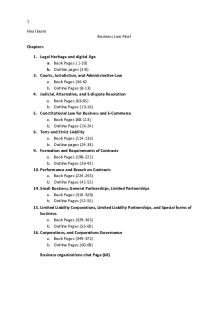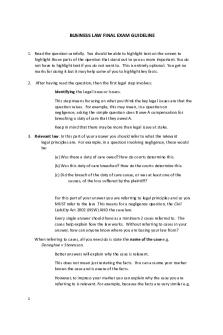Business Law Exam 2 Notes PDF

| Title | Business Law Exam 2 Notes |
|---|---|
| Course | Business Law I |
| Institution | Belmont University |
| Pages | 8 |
| File Size | 70.5 KB |
| File Type | |
| Total Downloads | 97 |
| Total Views | 156 |
Summary
Belmont University Business Law I (MGT 2410) Exam 2 Review/Notes...
Description
Business Law 1 Belmont University MGT 2410 Business Law I Exam 2 Review/Notes
True/False: Some promises are not legally binding T Resolving whether a promise should be enforced is a function of contract law T A party's intent to enter into a contract is judged by their personal, subjective intent or belief. If a contractual promise is not fulfilled, the person who made it may be required to perform the promised act. F If a contractual promise is not fulfilled, the person who made it may be required to perform the promised act. T The only requirement of a valid contract is that it be voluntarily entered into F Every contract involves at least 3 parties F "Consideration" Refers to the voluntary consent of all the parties to a contract. F One of the elements of a valid contract is a fair price F A bilateral contract comes into existence at the moment an offer is made F
An offer to form a unilateral contract is accepted by a promise to perform F A contract can be created only when a promise is given in exchange for another promise F No offer may be revoked before it is accepted F Informal contracts are usually based on their substance rather than their form T An express contract must be in writing F An implied contract is not an actual contract F Informal contracts include all contracts other than formal contracts. T In an express contract, the terms are fully stated in words T An executory contract is one that has been fully performed. F An executed contract is one that has been fully performed. T If a voidable contract is avoided, the parties to it are released from it. T A void contract is enforceable if it is in writing. F
An unenforceable contract is one that cannot be enforced because of certain legal defenses against it. T A void contract produces legal obligations on the parties but is not otherwise enforceable F A quasi contract is a true contract F A party who confers a benefit on someone else unnecessarily can invoke the principle of quasi contract to recover the cost F The doctrine of quasi contract can be used only when there is an actual con-tract that covers the matter in controversy. F Plain language laws regulate some types of contracts to require "legalese." F A reasonable, lawful, and effective meaning will normally be given to all of a contract's terms. T When the words in a contract have more than one meaning, they are cut from the contract. F An agreement is evidenced by a single event: an offer. F An offer must be practical to be effective. F
An offeror must have a serious intention to become bound by the offer. T An invitation to submit bids—"how much would you charge to do this work?"—is an offer F An invitation to negotiate—"can you afford this?"—is an offer. F An expression of opinion—"your customers will like this"—is an of¬fer. F A statement of future intent—"I plan to sell my 700-pound sow"—is an offer. F A price list is an offer F An advertisement—"this property for sale"—is an offer. F An auction—"we ask you to bid on this item"—is an offer F
A contract lacking a quantity term, when appropriate, may not be enforceable T An offer may invite an acceptance to be worded in such specific terms that the contract is made definite. F If no time for acceptance is specified in an offer, the offer terminates at the end of a reasonable time T
A counteroffer does not terminate but continues an offer F An offeree's power of acceptance is terminated when the offeror dies unless the offer is irrevocable T An offer that a statute makes illegal automatically terminates the offer. T An unequivocal acceptance operates as a rejection of the original offer F No offer can be accepted by silence F An acceptance subject to new conditions implicitly rejects the offer. F If an offeror does not expressly authorize a certain mode of acceptance, then acceptance may be made by any reasonable means. T Under the mailbox rule, an acceptance takes effect at the time it is sent. T An e-contract must meet the same basic requirements as a paper contract. T Terms in a shrink-wrap agreement have been enforced in the same way as the terms of other contracts T Browse-wrap terms are often unenforceable. T Under federal law, an electronic document can be as enforceable as a paper one.
T The UETA covers only e-records and e-signatures relating to a transaction. T The UETA does not apply to a transaction unless the parties agreed to conduct the transaction electronically T Contracting parties cannot opt out of the terms of the UETA. F The UETA applies to all writings and signatures. F An e-record is considered received under the UETA only if a person is aware of its receipt F To be legally sufficient, consideration must include something of economic value F A bargained-for exchange is one of the elements of consideration. T Inadequate consideration may indicate undue influence. T Normally, a court of law will not question the adequacy of consideration. T A promise to do something that one has a prior legal duty to do is not consideration T Unforeseen difficulties that justify a demand for additional compensation in-clude risks ordinarily assumed in business F
Rescission is the substitution of one party to a contract for a third party, who agrees to assume the contractual duties F A promise to pay for an act that has already occurred is enforceable because the event is certain F An illusory promise is a promise that is enforceable without consideration. F An accord and satisfaction requires that the amount of a debt be certain. F A release does not require consideration to be legally binding. F A covenant not to sue is against public policy. F A covenant not to sue is the substitution of a contractual obligation for a legal action T The doctrine of promissory estoppel requires a clear and definite promise. T Contractual capacity refers to the legal ability to enter into a contract. T A minor may disaffirm a contract only after attaining the age of majority. F A minor may disaffirm a contract only if the subject matter is illegal. F A minor's right to disaffirm a contract terminates sixty days after the contract's date
F Parents are ordinarily liable for the contracts made by their minor children, even if the children acted on their own F A person who enters into a contract when he or she is intoxicated can void the contract if the terms are obviously favorable to the other party F
A guardian can enter into legally binding contracts on behalf of a mentally incompetent person T A usurious contract involves the purchase and sale of usable goods. F If there is a statute that prohibits a certain action, a contract to do it is unenforceable T If the purpose of a licensing statute is to protect the public from unlicensed practitioners, a contract with an unlicensed professional is illegal. T A covenant not to compete is enforceable only if it is necessary to restrain trade F A covenant not to compete in the sale of an ongoing business is unenforceable. F...
Similar Free PDFs

Business Law Exam 2 Notes
- 8 Pages

Business Law 2 Revision Notes
- 32 Pages

Business Law 2 Notes Cases
- 26 Pages

Business LAW Final EXAM
- 70 Pages

Crim Law exam 2 notes
- 13 Pages

IB113 Business Law - Notes
- 83 Pages

Corporation Notes - Business Law
- 9 Pages

Business Law & Practice Notes
- 153 Pages

Business Law Notes
- 22 Pages

Business Law Midterm Notes
- 11 Pages

Business Law Chapter 2
- 4 Pages
Popular Institutions
- Tinajero National High School - Annex
- Politeknik Caltex Riau
- Yokohama City University
- SGT University
- University of Al-Qadisiyah
- Divine Word College of Vigan
- Techniek College Rotterdam
- Universidade de Santiago
- Universiti Teknologi MARA Cawangan Johor Kampus Pasir Gudang
- Poltekkes Kemenkes Yogyakarta
- Baguio City National High School
- Colegio san marcos
- preparatoria uno
- Centro de Bachillerato Tecnológico Industrial y de Servicios No. 107
- Dalian Maritime University
- Quang Trung Secondary School
- Colegio Tecnológico en Informática
- Corporación Regional de Educación Superior
- Grupo CEDVA
- Dar Al Uloom University
- Centro de Estudios Preuniversitarios de la Universidad Nacional de Ingeniería
- 上智大学
- Aakash International School, Nuna Majara
- San Felipe Neri Catholic School
- Kang Chiao International School - New Taipei City
- Misamis Occidental National High School
- Institución Educativa Escuela Normal Juan Ladrilleros
- Kolehiyo ng Pantukan
- Batanes State College
- Instituto Continental
- Sekolah Menengah Kejuruan Kesehatan Kaltara (Tarakan)
- Colegio de La Inmaculada Concepcion - Cebu




